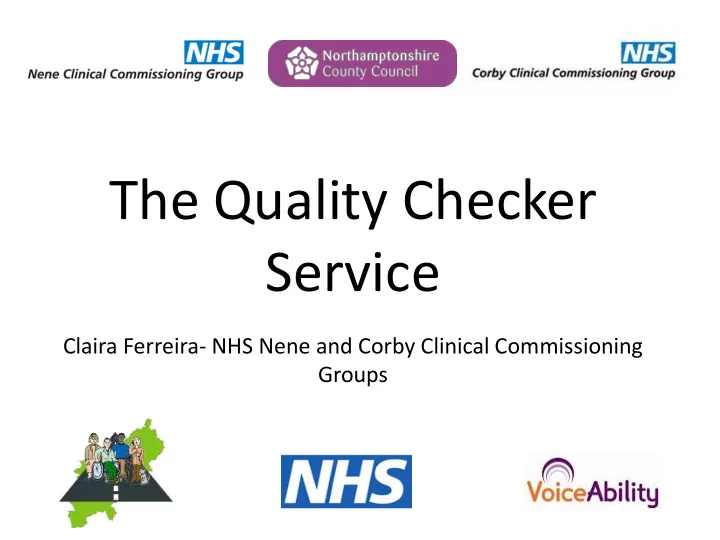

The Quality Checker Service Claira Ferreira- NHS Nene and Corby Clinical Commissioning Groups
History behind Quality Checking • 2005- Skills for People (Newcastle-Upon-Tyne) • 2006- The 11 REACH standards (in supported living) were developed (QCs with Paradigm) • Voiceability were involved in the Pilot projects when extended nationally • Social Return on Investment audit evaluated the value for money of Quality Checkers 2008-2010
Winterbourne View • Abuse at Winterbourne • Commissioners had poor systems in place to monitor individuals • The voice of the person with learning disabilities was completely ignored
Why Quality Checking? • The person’s voice will be • Experts by Experience heard • Checking from a person’s • Quality Checking is good perspective for providers & • Provides the person (the commissioners & carer/circle of support) individuals with an opportunity to • We can all work together engage directly with an expert
What we put in- what we get out OUT IN • Joint working with the Council • Health Funding • single audit tools • County Council Funding • Available resource to help with developing with commissioning • Time/resource to activity procure and set up service • Linking with other health funded projects • Operational meetings • Employment, training and skill building for Quality Checkers • Contract meetings • Benchmarking good/poor practice and raising expectations of good care • Engaging with individuals- commissioners knowing people better
More In-Outs OUT IN • Real time feedback • Contributing to other things- i.e Driving UP Quality Code- Learning Disability Self-Assesment Framework • Sharing what’s good/not good at provider events • Highlighting areas of concerns (so appropriate professionals can be engaged) • Potential savings if recommendations are followed and providers/commissioners are on “board”
Tools of the Quality Checker Job • Easy Read Joint Audit Tool developed from: NCC and CCGs Quality and Contract monitoring recording templates, The REACH standards, DH Winterbourne ‘Transforming Care’ 12 point model of care, the Quality Checkers • Report focusing on what’s working/not working • Feedback form for providers to complete • Follow up contact and report of what’s changed
The Quality Checker’s Report • What’s Good (so good practice can be shared and celebrated) • What’s not good • Recommendations for improvements
Recommendations- what’s changed? The lady spends all the time in bed- can a buddy service go and see her like They need to sort out the they do in hospital? cracks as he didn’t like it He want’s a girlfriend, he might find one at PHAB or staff could The staff could also help him find a girl on the help with the dentist internet- he could go to a social and help the resident Group and meet people to have her teeth done If he can’t have a cat in Staff need to knock on the home maybe the staff doors could take him to the RSPCA
A Real Story • The Person - “I would like to move somewhere else, like a bungalow….somewhere near my mum. I would like to see her more… yes please” • The Quality Checker - “he should have an advocate to help him talk about the things he don’t like and get him a move” • The Provider- “he now has an advocate to support him”
The Benefits • Training, skills and employment for people with a learning disability • The experts helping to inform and define what good quality care looks like for themselves and others • Individuals having a ‘voice’ • Direct link to commissioners for real-time feedback • Clear pathway for Quality Checkers to alert concerns
The Benefits Cont/
Feedback the service has received so far It is helpful to get feedback on He was a pleasure to potential improvements and to meet- our young get input from someone who people connected with can bring ideas and suggestions him Having fresh eyes or different values looking at We would like four the approach you have visits a year! helps the practice and not habitual or out of date “Quality Checkers Change Attitudes”
“People who receive support want to be able to live a full life, just like someone who does not require support. They want to have choices, they want to live in a nice place with people they like, and they want to spend time with people they can respect and who respect them. This “user experience” is much more difficult to measure. Hugo Minney 2011
Over to the Experts
Recommend
More recommend